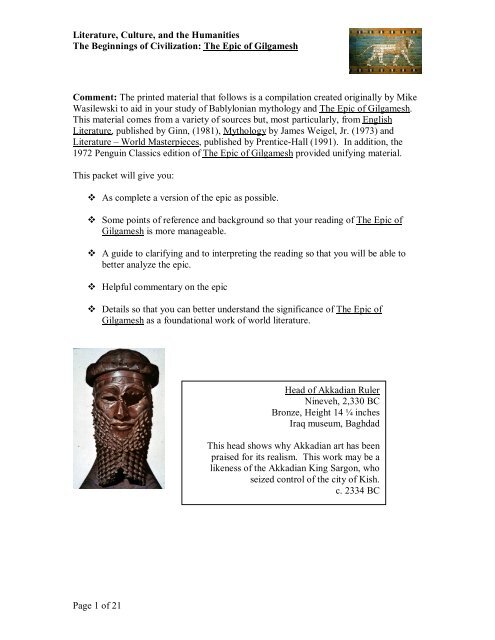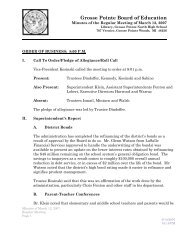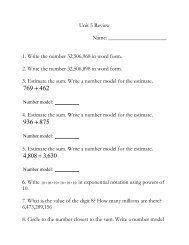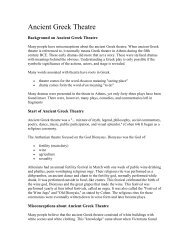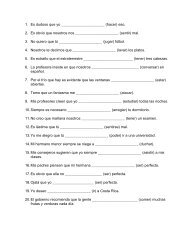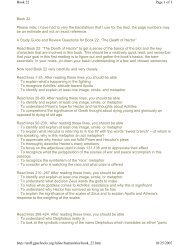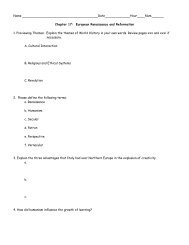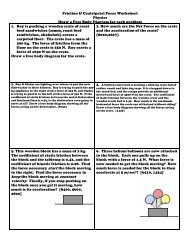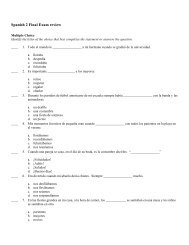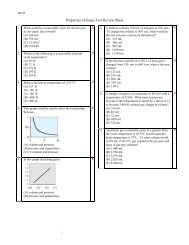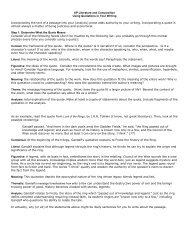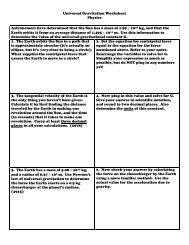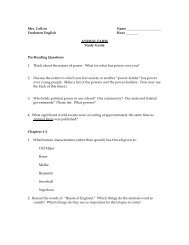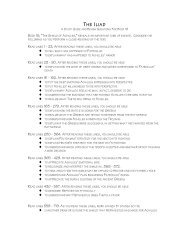The Epic of Gilgamesh
The Epic of Gilgamesh
The Epic of Gilgamesh
You also want an ePaper? Increase the reach of your titles
YUMPU automatically turns print PDFs into web optimized ePapers that Google loves.
Literature, Culture, and the Humanities<br />
<strong>The</strong> Beginnings <strong>of</strong> Civilization: <strong>The</strong> <strong>Epic</strong> <strong>of</strong> <strong>Gilgamesh</strong><br />
Comment: <strong>The</strong> printed material that follows is a compilation created originally by Mike<br />
Wasilewski to aid in your study <strong>of</strong> Bablylonian mythology and <strong>The</strong> <strong>Epic</strong> <strong>of</strong> <strong>Gilgamesh</strong>.<br />
This material comes from a variety <strong>of</strong> sources but, most particularly, from English<br />
Literature, published by Ginn, (1981), Mythology by James Weigel, Jr. (1973) and<br />
Literature – World Masterpieces, published by Prentice-Hall (1991). In addition, the<br />
1972 Penguin Classics edition <strong>of</strong> <strong>The</strong> <strong>Epic</strong> <strong>of</strong> <strong>Gilgamesh</strong> provided unifying material.<br />
This packet will give you:<br />
As complete a version <strong>of</strong> the epic as possible.<br />
Some points <strong>of</strong> reference and background so that your reading <strong>of</strong> <strong>The</strong> <strong>Epic</strong> <strong>of</strong><br />
<strong>Gilgamesh</strong> is more manageable.<br />
A guide to clarifying and to interpreting the reading so that you will be able to<br />
better analyze the epic.<br />
Helpful commentary on the epic<br />
Details so that you can better understand the significance <strong>of</strong> <strong>The</strong> <strong>Epic</strong> <strong>of</strong><br />
<strong>Gilgamesh</strong> as a foundational work <strong>of</strong> world literature.<br />
Head <strong>of</strong> Akkadian Ruler<br />
Nineveh, 2,330 BC<br />
Bronze, Height 14 ¼ inches<br />
Iraq museum, Baghdad<br />
This head shows why Akkadian art has been<br />
praised for its realism. This work may be a<br />
likeness <strong>of</strong> the Akkadian King Sargon, who<br />
seized control <strong>of</strong> the city <strong>of</strong> Kish.<br />
c. 2334 BC<br />
Page 1 <strong>of</strong> 21
Literature, Culture, and the Humanities<br />
<strong>The</strong> Beginnings <strong>of</strong> Civilization: <strong>The</strong> <strong>Epic</strong> <strong>of</strong> <strong>Gilgamesh</strong><br />
Babylonian Mythology: Introduction<br />
Most records <strong>of</strong> Babylonian myths date from approximately 700 BC, when they were<br />
transcribed in cuneiform, a wedge-shaped writing, on clay tablets and stored in the library<br />
<strong>of</strong> the Assyrian King, Ashurbanipal (As-er-BAN-i-pal) at Nineveh. However, two major<br />
Babylonian epics originated around 2,000 BC:<br />
• <strong>The</strong> <strong>Epic</strong> <strong>of</strong> Creation justifies the rule <strong>of</strong> the principal deity <strong>of</strong> the Babylonians, Marduk,<br />
over all the gods and over all men. <strong>The</strong> epic reflects political supremacy <strong>of</strong> Babylon in<br />
Mesopotamia, since Marduk was the chief god <strong>of</strong> that city.<br />
• <strong>The</strong> <strong>Epic</strong> <strong>of</strong> <strong>Gilgamesh</strong>, the focus <strong>of</strong> our study, showcases the importance <strong>of</strong> self-respect<br />
and accomplishment, the significance <strong>of</strong> friendship, and the inevitability <strong>of</strong> man’s death.<br />
Generally Babylonian mythology … is … earthbound and …materialistic. Death<br />
puts an end to the sensational pleasures <strong>of</strong> life, and the underworld <strong>of</strong> the dead is the most<br />
dismal place imaginable. <strong>The</strong> Babylonian gods themselves indulge in eroticism, feasting,<br />
and fighting (Weigel).<br />
What is the <strong>Gilgamesh</strong> <strong>Epic</strong>?<br />
<strong>The</strong> <strong>Gilgamesh</strong> epic is a long narrative poem about a Sumerian king named<br />
<strong>Gilgamesh</strong> who lived between 2, 700 and 2,500 BC—an era about twenty three times<br />
more distant from us than our own Revolutionary War. Although this poem is probably<br />
the oldest work you have ever read, its concerns are timeless and universal: how to<br />
become known and respected, how to cope with the loss <strong>of</strong> a dear friend, and how to<br />
accept one’s own inevitable death.<br />
Unlike modern books, this epic does not have a single author. Stories about King<br />
<strong>Gilgamesh</strong> were told and were handed down by Sumerians for hundreds <strong>of</strong> years after his<br />
death. By the twenty-first BC, however, these tales existed in written form. When the<br />
Babylonians conquered the Sumerians, soon afterwards, they usurped the Sumerian<br />
cultural tradition. A Babylonian author, borrowing from some <strong>of</strong> these tales, created a<br />
unified epic about the legendary Sumerian king. Other Babylonian writers modified the<br />
epic and, in the seventh century BC, it was included in the library <strong>of</strong> the Assyrian king,<br />
Ashurbanipal.<br />
<strong>The</strong> <strong>Gilgamesh</strong> epic was an international favorite <strong>of</strong> its time, translated into many<br />
ancient Near Eastern languages. After the fall <strong>of</strong> Babylon, however, the story survived<br />
only in folklore. <strong>The</strong> written epic was lost until archaeologists excavated Ashurbanipal’s<br />
library in the last century. <strong>The</strong>y discovered the poem written on clay tablets.<br />
Archaeologists were especially excited by the portion <strong>of</strong> the epic describing a great flood,<br />
an account remarkably similar to the story <strong>of</strong> Noah’s ark in the Bible (Literature-World<br />
Masterpieces).<br />
Page 2 <strong>of</strong> 21
Literature, Culture, and the Humanities<br />
<strong>The</strong> Beginnings <strong>of</strong> Civilization: <strong>The</strong> <strong>Epic</strong> <strong>of</strong> <strong>Gilgamesh</strong><br />
<strong>The</strong> Key Players in the <strong>Epic</strong>:<br />
Enkidu (en’ key do) <strong>Gilgamesh</strong>’s friend and advisor –molded by the goddess Aruru, the<br />
goddess <strong>of</strong> creation, out <strong>of</strong> clay in the image and <strong>of</strong> the essence <strong>of</strong> Anu, the sky god, and<br />
<strong>of</strong> Ninurta, the war god. Enkidu is a wild or “natural” man; he was later considered a<br />
patron <strong>of</strong> god and animals.<br />
<strong>Gilgamesh</strong> (gil gah mesh) the hero <strong>of</strong> the epic, king <strong>of</strong> Uruk—son <strong>of</strong> the goddess Ninsun<br />
and <strong>of</strong> a priest <strong>of</strong> Kullab, fifth king <strong>of</strong> Uruk after the flood, famous as a great builder.<br />
Humbaba (heum bah ba) the giant who guards the cedar forest, a nature divinity.<br />
Ishtar (ish tar) the goddess <strong>of</strong> love, one <strong>of</strong> the most popular Babylonian deities, Ishtar is<br />
the goddess <strong>of</strong> sexuality, a potent force among beasts and men. She sanctified temple<br />
prostitution. Lustful herself, Ishtar had numerous lovers, most <strong>of</strong> whom had dreadful<br />
fates. Ishtar is also the goddess <strong>of</strong> war, and is <strong>of</strong>ten called the Queen <strong>of</strong> Heaven. She<br />
was the patroness <strong>of</strong> Uruk where she had a temple/<br />
Ninsun (nin sun) the mother <strong>of</strong> <strong>Gilgamesh</strong>, a minor goddess whose house was in Uruk;<br />
she was noted for wisdom and was the wife <strong>of</strong> Lugulbanda (lew goal bahn da).<br />
Urshanabi (erh sha nah bee) Utnapishtim’s ferryman. Urshanabi ferries daily across the<br />
waters <strong>of</strong> death which divide the garden on the sun from the paradise where Utnapishtim<br />
lives forever. As such, Utnapishtim has eternal life. His fate, however, changes as a<br />
result <strong>of</strong> his accepting <strong>Gilgamesh</strong> as a passenger.<br />
Utnapishtim (eut nah piesh tem) the Mesopotamian “Noah”, survivor <strong>of</strong> the great flood<br />
who lives eternally at “the mouth <strong>of</strong> the rivers”—his name is usually translated as “He<br />
who saw Life” he is <strong>of</strong>ten referred to as the “Faraway”.<br />
Important Places in <strong>The</strong> <strong>Epic</strong> <strong>of</strong> <strong>Gilgamesh</strong>:<br />
Eanna (e anna) the temple precinct in Uruk sacred to Anu and Ishtar<br />
Shurrupak (sha rue peck) an ancient Sumerian city, eighteen miles northwest <strong>of</strong> Uruk;<br />
Utnapishtim lived here before the time <strong>of</strong> the flood<br />
Uruk (eugh rok [rhymes with crook]) an ancient Sumerian city on the Euphrates River<br />
Page 3 <strong>of</strong> 21
Literature, Culture, and the Humanities<br />
<strong>The</strong> Beginnings <strong>of</strong> Civilization: <strong>The</strong> <strong>Epic</strong> <strong>of</strong> <strong>Gilgamesh</strong><br />
Important gods in Babylonian Mythology<br />
Adad (ay dad) the god <strong>of</strong> storms and weather<br />
Anunnaki (ah knew nah key) gods <strong>of</strong> the underworld, judges <strong>of</strong> the dead<br />
Anu (ay knew) the father <strong>of</strong> the gods and god <strong>of</strong> the sky, reigned in the uppermost<br />
part <strong>of</strong> heaven and had an army <strong>of</strong> stars to destroy evildoers<br />
Aruru (ah ruh ruh) a goddess <strong>of</strong> creation, she created Enkidu from clay in the<br />
image <strong>of</strong> Anu<br />
Belit-Sheri (bell eat share ey) the scribe for the underworld gods<br />
Ea (ay ah) the god <strong>of</strong> the waters and <strong>of</strong> wisdom, carries all-encompassing<br />
wisdom, a patron <strong>of</strong> arts; one <strong>of</strong> the creators <strong>of</strong> man, towards whom he is usually<br />
well-disposed<br />
Enlil (en’ lil [rhymes with hill]) the god <strong>of</strong> earth, wind, and air, also the source <strong>of</strong><br />
royal power who dealt out good and evil to men<br />
Irkalla (erh kah leh) the queen <strong>of</strong> the underworld [also known as Ereshkigal]<br />
Marduk (marr duck) a fertility god and the principal deity <strong>of</strong> Babylon. He<br />
established lordship over all the other gods by killing the malevolent and chaotic<br />
Tiamat and by creating the world out <strong>of</strong> Tiamat’s body<br />
Namtar (nam tar) the god <strong>of</strong> evil fate, bringer <strong>of</strong> disease and pestilence<br />
Samuqan (sam we can) the god <strong>of</strong> cattle<br />
Shamash (sha mahsh) the sun-god with some fertility attributes; judge and lawgiver<br />
pictured with a saw with which he cuts decisions; husband and brother <strong>of</strong><br />
Ishtar<br />
Siduri (sih duhr E) the divine wine-maker and brewer; she lives on the shore <strong>of</strong><br />
the sea in the garden <strong>of</strong> the sun<br />
(Weigel and Literature – World Masterpieces)<br />
Page 4 <strong>of</strong> 21
Literature, Culture, and the Humanities<br />
<strong>The</strong> Beginnings <strong>of</strong> Civilization: <strong>The</strong> <strong>Epic</strong> <strong>of</strong> <strong>Gilgamesh</strong><br />
Reading Critically: Sumerian, Egyptian, and Hebrew Culture<br />
<strong>The</strong> Historical Context<br />
Situated on the Tigris and the Euphrates Rivers, ancient Mesopotamia was<br />
simultaneously a region <strong>of</strong> plenty and <strong>of</strong> poverty, opportunity and danger. Frequent<br />
floods created rich soil. Yet floods could also be violent and unpredictable, and the<br />
summer droughts could turn the soil to dust and whither crops. With its two major rivers,<br />
the region was ideally situated for trade. However, the flat alluvial plain, without forest<br />
or other natural obstacles, left the region open to invaders.<br />
Between 2,500 and 500 BC, Mesopotamia was invaded repeatedly. Those who built the<br />
first great civilization on the two rivers, the Sumerians, gave way to the Babylonians and<br />
the Babylonians gave way to the Assyrians. As <strong>of</strong>ten happens, however, the conquerors<br />
adopted the culture <strong>of</strong> the conquered. <strong>The</strong> <strong>Epic</strong> <strong>of</strong> <strong>Gilgamesh</strong> itself is eloquent testimony<br />
to this fact: <strong>The</strong> <strong>Epic</strong> <strong>of</strong> <strong>Gilgamesh</strong> is the tale <strong>of</strong> the Sumerian ruler shaped by<br />
Babylonians and later preserved in the library <strong>of</strong> a great Assyrian king.<br />
Page 5 <strong>of</strong> 21
Literature, Culture, and the Humanities<br />
<strong>The</strong> Beginnings <strong>of</strong> Civilization: <strong>The</strong> <strong>Epic</strong> <strong>of</strong> <strong>Gilgamesh</strong><br />
<strong>The</strong> Cultural Context<br />
As a result <strong>of</strong> living in a region threatened by floods and invaders, ancient neareastern<br />
religion reflected the insecurities <strong>of</strong> life. Most everything was viewed<br />
pessimistically. Mesopotamians believed for example, that they were created only to<br />
serve the gods. <strong>The</strong>se unpredictable, quarreling, working, eating, drinking, and all-toohuman<br />
gods had absolute control over human destiny with, <strong>of</strong>ten times, little regard for<br />
men. Another key influence coloring their perception was the Mesopotamian vision <strong>of</strong><br />
the underworld as a dreary and inhospitable place.<br />
<strong>The</strong> Literary Context<br />
Both the Sumerians and the Babylonians had schools <strong>of</strong> scribes who created a<br />
varied and impressive literature. Among the works they produced were essays, proverbs,<br />
dialogues, myths, hymns, and epics. As the <strong>Gilgamesh</strong> tale passed through the hands <strong>of</strong><br />
these authors, it was continually reshaped. <strong>The</strong> Babylonians, who fashioned the epic as<br />
we know it today, added the prologue and flood story emphasized the friendship between<br />
<strong>Gilgamesh</strong> and Enkidu. Most important, they gave the narrative its central theme: the<br />
search for immortality (Literature – World Masterpieces).<br />
Administrative tablet with cylinder seal<br />
impression <strong>of</strong> a male figure, hunting<br />
dogs, and boars, 3100–2900 B.C.; Jemdet<br />
Nasr period (Uruk III script)<br />
Mesopotamia<br />
Clay; H. 2 in. (5.3 cm)<br />
Purchase, Raymond and Beverly Sackler<br />
Gift, 1988 (1988.433.1)<br />
Page 6 <strong>of</strong> 21
Literature, Culture, and the Humanities<br />
<strong>The</strong> Beginnings <strong>of</strong> Civilization: <strong>The</strong> <strong>Epic</strong> <strong>of</strong> <strong>Gilgamesh</strong><br />
<strong>Epic</strong>: <strong>The</strong> Definition Known, Understood, and Used by<br />
Humanities Students<br />
(Yes, you should know this extremely well)<br />
<strong>The</strong> <strong>Epic</strong> is a long narrative poem presented in an elevated style, relating the<br />
heroic deeds <strong>of</strong> noble or semi-divine personages. Traditional or fold epics<br />
originated in traditional legends dating back to a remote past and handed<br />
down orally through generations <strong>of</strong> singers. At some point, an individual<br />
put all the pieces together in written form. Literary epics developed later<br />
and were modeled on the original oral epics.<br />
Seven features are associated with the epic:<br />
One: <strong>The</strong> characters are <strong>of</strong> noble birth, or they are supernatural beings from the past.<br />
If, for any reason, a person <strong>of</strong> a lower estate is introduced, the person’s name is never<br />
mentioned.<br />
Two:<br />
Three:<br />
Four:<br />
Five:<br />
Six:<br />
Seven:<br />
<strong>The</strong> action is on an immense scale and involves the fate <strong>of</strong> a whole people<br />
or even the entire human race. Gods or semi-divine creatures come to the<br />
aid <strong>of</strong> one side or another.<br />
<strong>The</strong> author usually announces the theme at the opening <strong>of</strong> the epic and …<br />
calls upon the muses to help him in his narration.<br />
<strong>The</strong> poem usually begins at a critical point in the action.<br />
<strong>The</strong> style is noble and majestic; with the characters <strong>of</strong>ten speaking<br />
ceremoniously in long set speeches.<br />
Literary inventories—listings and descriptions <strong>of</strong> characters or objects—<br />
<strong>of</strong>ten form part <strong>of</strong> the descriptive passages.<br />
Such features had become so predictable that a kind <strong>of</strong> anti-epic developed<br />
that became known as a mock epic. <strong>The</strong> mock epic uses all the epic elements<br />
in wrong or bizarre ways so that they appear ridiculous to the audience.<br />
Features <strong>of</strong> the mock epic are very common in contemporary comedy<br />
(English Literature).<br />
Page 7 <strong>of</strong> 21
Literature, Culture, and the Humanities<br />
<strong>The</strong> Beginnings <strong>of</strong> Civilization: <strong>The</strong> <strong>Epic</strong> <strong>of</strong> <strong>Gilgamesh</strong><br />
Note: <strong>The</strong> following text <strong>of</strong> <strong>The</strong> <strong>Epic</strong> <strong>of</strong> <strong>Gilgamesh</strong> is a compilation to give you as<br />
complete a version <strong>of</strong> the epic as possible. This material is not, however, totally<br />
complete. At times, as you move through this handout, you will be asked to go to your<br />
text and read some <strong>of</strong> the material from the epic given to you there. Going between this<br />
handout and your text will give you a relatively complete understanding <strong>of</strong> the epic, its<br />
plot, and its characters.<br />
<strong>The</strong> <strong>Epic</strong> Begins…<br />
I will proclaim to the world the deeds <strong>of</strong><br />
<strong>Gilgamesh</strong>. This was the man to whom<br />
all things were known; this was the king<br />
who knew countries <strong>of</strong> the world. He<br />
was wise, he saw mysteries, and knew<br />
secret things, he brought us a tale <strong>of</strong> the<br />
days before the flood. He went on a<br />
long journey, was weary, and worn-out<br />
with labor. Returning, he rested and<br />
then engraved on a stone the whole<br />
story:<br />
When the Gods created <strong>Gilgamesh</strong> they<br />
gave him a perfect body. Shamash, the<br />
glorious sun-god, endowed him with<br />
beauty, Adad, the god <strong>of</strong> the storm,<br />
endowed him with courage. <strong>The</strong> great<br />
gods made his beauty perfect. Though<br />
<strong>Gilgamesh</strong> surpassed all others in<br />
beauty, in the minds and hearts <strong>of</strong> his<br />
people, he was terrifying like a great<br />
wild bull. Two-thirds he was made god<br />
and one-third man.<br />
In Uruk, he built walls, a great rampart,<br />
and the temple <strong>of</strong> blessed Eanna for the<br />
god <strong>of</strong> the firmament, Anu, and for<br />
Ishtar, the goddess <strong>of</strong> love. Look at it<br />
still today: the outer wall where the<br />
cornice runs, it shines with the brilliance<br />
<strong>of</strong> copper; and the inner wall, it has no<br />
equal. Touch the threshold, it is ancient.<br />
Approach Eanna, the dwelling <strong>of</strong> Ishtar,<br />
our lady <strong>of</strong> love and war, the like <strong>of</strong><br />
which neither latter-day king, nor any<br />
man alive can equal. Climb upon the<br />
wall <strong>of</strong> Uruk; walk along it, I say: regard<br />
the foundation terrace and examine the<br />
masonry; is it not burnt brick and good?<br />
<strong>The</strong> seven sages laid the foundation.<br />
<strong>Gilgamesh</strong> was wise and powerful,<br />
famed for his exploits in war, and for his<br />
prowess as an unbeatable wrestler,<br />
however, he was tyrannical and arrogant<br />
as well as lustful. <strong>The</strong>se traits concerned<br />
the people. Because <strong>of</strong> his lustfulness,<br />
<strong>Gilgamesh</strong> would abduct any woman<br />
who took his fancy whether she was<br />
single or married. <strong>The</strong> people <strong>of</strong> Uruk<br />
were greatly distressed at this for no one<br />
could overcome <strong>Gilgamesh</strong>. <strong>The</strong>y<br />
prayed to the goddess Aruru to fashion a<br />
man who could overpower <strong>Gilgamesh</strong> in<br />
order that he would leave their women in<br />
peace.<br />
Aruru created the mighty Enkidu, a hairy<br />
man with legs like a bull. At first<br />
Enkidu lived like a wild animal and had<br />
no contact with other humans. As<br />
Page 8 <strong>of</strong> 21
Literature, Culture, and the Humanities<br />
<strong>The</strong> Beginnings <strong>of</strong> Civilization: <strong>The</strong> <strong>Epic</strong> <strong>of</strong> <strong>Gilgamesh</strong><br />
Enkidu roamed with the wild beasts, he<br />
enabled them to escape the traps <strong>of</strong><br />
hunters. On hearing <strong>of</strong> Enkidu’s<br />
strength, <strong>Gilgamesh</strong> sent a courtesan to<br />
Enkidu’s watering place to entice him.<br />
Upon seeing Enkidu, the courtesan<br />
disrobed and exposed her breasts.<br />
Enticed, Enkidu went to live with her.<br />
After this, Enkidu’s animal companions<br />
shunned him because he had lost his<br />
natural innocence. Enkidu could do<br />
nothing but return to Uruk with the<br />
courtesan.<br />
Meanwhile, back in his palace,<br />
<strong>Gilgamesh</strong> had dreamed <strong>of</strong> struggling<br />
with a powerful man who could master<br />
him. When he told his dream to his<br />
mother, Ninsun, she said it meant that<br />
Enkidu, the hairy man with legs like a<br />
bull, and <strong>Gilgamesh</strong> would become close<br />
companions. Upon meeting, the two<br />
engaged in a wrestling match unlike any<br />
other seen before and though Enkidu<br />
eventually lost to <strong>Gilgamesh</strong>, the two<br />
became such friends that <strong>Gilgamesh</strong><br />
invited Enkidu to live in the palace and<br />
to share his kingly honors.<br />
After many years <strong>of</strong> friendship, one<br />
night Enkidu had a nightmare in which<br />
he was snatched up by a strange, terrible<br />
creature with eagle claws, who cast him<br />
into the underworld <strong>of</strong> death. Because<br />
<strong>of</strong> his tormenting dreams, which were<br />
perceived as a sickness, Enkidu slept far<br />
removed from anyone else in the castle.<br />
[Bear in mind that the Mesopotamian<br />
view <strong>of</strong> the world <strong>of</strong> the dead was<br />
depressing and hopeless. <strong>The</strong> tombs <strong>of</strong><br />
the famous contained treasures and<br />
human attendants sacrificed to<br />
accompany them, but the afterlife itself<br />
was dark and gloomy.]<br />
When <strong>Gilgamesh</strong> heard this dream, he<br />
<strong>of</strong>fered a sacrifice to Shamash, the sungod,<br />
to find out what he should do to<br />
stop these dreams and save Enkidu from<br />
impending death. Shamash advised<br />
<strong>Gilgamesh</strong> to go and fight Humbaba the<br />
Strong, king <strong>of</strong> the Cedar Forest and <strong>of</strong><br />
Cedar Mountain. Because <strong>of</strong> his great<br />
friendship with Enkidu, <strong>Gilgamesh</strong><br />
immediately agreed to do this. When<br />
Enkidu, Ninsun, and the people <strong>of</strong> Uruk<br />
hear <strong>of</strong> <strong>Gilgamesh</strong>’s plan, they tried to<br />
dissuade <strong>Gilgamesh</strong> from a plan they<br />
saw as all too threatening and dangerous.<br />
<strong>The</strong>ir pleas, however, were <strong>of</strong> no avail.<br />
<strong>Gilgamesh</strong> knew he must save Enkidu.<br />
<strong>Gilgamesh</strong> was determined to make the<br />
long arduous journey to battle Humbaba.<br />
Enkidu joined his friend, and the two<br />
went forth.<br />
<strong>Gilgamesh</strong> and Enkidu traveled<br />
northwest, leaving their fertile land<br />
behind, crossing a vast dessert, reaching<br />
the Amanus Mountains, and finally<br />
arriving at the resplendent Cedar<br />
Mountain and the stockade <strong>of</strong> the<br />
monster Humbaba.<br />
<strong>Gilgamesh</strong> issued a challenge to<br />
Humbaba but no answer came. <strong>The</strong>y<br />
made a sacrifice to the gods and settled<br />
down for the night. During the night,<br />
<strong>Gilgamesh</strong> had a dream <strong>of</strong> victory, but<br />
the next morning, with his heart<br />
quailing, Enkidu expressed his fears:<br />
“Oh my lord, you do not know this<br />
monster and that is the reason you are<br />
unafraid. I who know him, I am<br />
terrified. His teeth are dragon’s fangs,<br />
Page 9 <strong>of</strong> 21
Literature, Culture, and the Humanities<br />
<strong>The</strong> Beginnings <strong>of</strong> Civilization: <strong>The</strong> <strong>Epic</strong> <strong>of</strong> <strong>Gilgamesh</strong><br />
his countenance is like a lion, his charge<br />
is the rushing <strong>of</strong> a flood, with his look he<br />
crushes alike the trees <strong>of</strong> the forest and<br />
the reeds in the swamp. O my lord, you<br />
may go on if you choose into this land,<br />
but I will go back to the city. I will tell<br />
the lady your mother all your glorious<br />
deeds till she shouts for joy; and then I<br />
will tell <strong>of</strong> the death that followed till<br />
she weeps for bitterness.”<br />
But <strong>Gilgamesh</strong> said, “Immolation and<br />
sacrifice are not yet for me, the boat <strong>of</strong><br />
the dead shall not go down, nor the<br />
three-ply cloth be cut for my shrouding.<br />
Not yet will my people be desolate, nor<br />
the pyre be lit in my house and my<br />
dwelling burnt on the fire. Today, give<br />
me your aid and you shall have mine;<br />
what can go amiss with us two? All<br />
living creatures born <strong>of</strong> the flesh shall sit<br />
at last in the boat <strong>of</strong> the West, and when<br />
it sinks, when the boat <strong>of</strong> Magilum<br />
sinks, they are gone; but we shall go<br />
forward and fix our eyes on this monster.<br />
If your heart is fearful, throw away fear,<br />
if there is terror in it, throw away terror.<br />
Take your ax in your hand and attack.<br />
He who leaves the fight unfinished is not<br />
at peace.”<br />
Humbaba stood in front <strong>of</strong> his strong<br />
house <strong>of</strong> cedar. Enkidu called out, “O<br />
<strong>Gilgamesh</strong>, remember now your boasts<br />
in Uruk. Forward, attack, son <strong>of</strong> Uruk,<br />
there is nothing to fear.” When he heard<br />
these words, his courage rallied; he<br />
answered, “Make haste, close in, if the<br />
watchman is there, do not let him escape<br />
to the woods where he will vanish. He<br />
has put on the first <strong>of</strong> his seven<br />
splendors but not yet the other six; let us<br />
trap him before he is armed.”<br />
Like a raging wild bull, Humbaba<br />
snuffed the ground; the watchman <strong>of</strong> the<br />
woods turned full <strong>of</strong> threatenings, he<br />
cried out. He nodded his head and<br />
shook it, menacing <strong>Gilgamesh</strong>; and on<br />
him he fastened his eye, the eye <strong>of</strong> death.<br />
<strong>The</strong>n <strong>Gilgamesh</strong> called to Shamash and<br />
his tears were flowing, “O glorious<br />
Shamash, I have followed the road you<br />
have commanded but now if you send no<br />
succor how shall I escape?” Glorious<br />
Shamash heard his prayer and he<br />
summoned the great winds: the north<br />
wind, the whirlwind, the storm and the<br />
icy wind,, the tempest and the scorching<br />
wind; they came like dragons, like a<br />
scorching fire, like a serpent that freezes<br />
the heart, a destroying flood and the<br />
lightning’s fork. <strong>The</strong> eight winds rose<br />
up against Humbaba, they beat against<br />
his eyes; he was gripped, unable to go<br />
forward or back. <strong>Gilgamesh</strong> shouted,<br />
“By the life <strong>of</strong> Ninsun my mother and<br />
divine Lugulbanda my father, in the<br />
Country <strong>of</strong> the Living, in this land I have<br />
discovered your dwelling; my weak<br />
arms and my strong weapons I have<br />
brought to this land against you, and<br />
now I will enter your house.” Humbaba<br />
charged them and a terrific fight<br />
followed.<br />
<strong>Gilgamesh</strong> felled one cedar and they cut<br />
the branches and laid them at the foot <strong>of</strong><br />
the mountain. At the first stroke<br />
Humbaba blazed out, but still they<br />
advanced. <strong>The</strong>y felled seven cedars and<br />
cut and bound the branches and laid<br />
them at the foot <strong>of</strong> the mountain, and<br />
seven times Humbaba loosed his glory<br />
on them. As the seventh blaze died out,<br />
they reached his lair. Humbaba slapped<br />
his thigh in scorn but waited like a noble<br />
Page 10 <strong>of</strong> 21
Literature, Culture, and the Humanities<br />
<strong>The</strong> Beginnings <strong>of</strong> Civilization: <strong>The</strong> <strong>Epic</strong> <strong>of</strong> <strong>Gilgamesh</strong><br />
wild bull roped on the mountain, a<br />
warrior whose elbows are bound<br />
together. <strong>The</strong> tears started in his eyes<br />
and he was pale, “<strong>Gilgamesh</strong>, let me<br />
speak. I have never known a mother, no,<br />
nor a father who reared me. I was born<br />
<strong>of</strong> the mountain, he reared me, and Enlil<br />
made me the keeper <strong>of</strong> this forest. Let<br />
me go free, <strong>Gilgamesh</strong>, and I will be<br />
your servant, you shall be my lord; all <strong>of</strong><br />
the trees <strong>of</strong> the forest that I tend on the<br />
mountain shall be yours. I will cut them<br />
down and build you a palace.”<br />
Humbaba took <strong>Gilgamesh</strong> by the hand<br />
and led him to his house, so that the<br />
heart <strong>of</strong> <strong>Gilgamesh</strong> was moved with<br />
compassion. <strong>Gilgamesh</strong> swore by the<br />
heavenly life, by the earthly life, by the<br />
underworld itself: “O Enkidu, should not<br />
the snared bird return to its nest and the<br />
captive man return to his mother’s<br />
arms?” Enkidu answered, “<strong>The</strong><br />
strongest <strong>of</strong> men will fall to fate if he has<br />
no judgment. Namtar, the evil fate that<br />
knows distinction between men, will<br />
devour him. If the snared bird returns to<br />
his mother’s arms, and you, my friend,<br />
will never return to the city where the<br />
mother is waiting who gave you birth.<br />
He will bar the mountain road against<br />
you, and make the pathways<br />
impassable.”<br />
Humbaba said, “Enkidu, what you have<br />
spoken is evil: you, a hireling, dependent<br />
for your bread! In envy and for fear <strong>of</strong> a<br />
rival you have spoken evil words.”<br />
Enkidu said, “Do not listen <strong>Gilgamesh</strong>:<br />
this Humbaba must die! Kill Humbaba<br />
first and his servants after.”<br />
But <strong>Gilgamesh</strong> said, “If we touch him;<br />
the blaze and the glory <strong>of</strong> light will be<br />
put out in confusion, the glory and<br />
glamour will vanish, its rays will be<br />
quenched.”<br />
Enkidu said to <strong>Gilgamesh</strong>, “Not so, my<br />
friend. First entrap the bird, and where<br />
shall the chicks run then? Afterwards<br />
we can search out the glory and the<br />
glamour, when the chicks run distracted<br />
through the grass.”<br />
<strong>Gilgamesh</strong> listened to the word <strong>of</strong> his<br />
companion, he took the ax in his hand,<br />
he drew the sword from his belt and he<br />
struck Humbaba with a thrust <strong>of</strong> the<br />
sword to the neck, and Enkidu, his<br />
comrade, struck the blow. At the third<br />
blow, Humbaba fell. <strong>The</strong>n there<br />
followed confusion for this was the<br />
guardian <strong>of</strong> the forest whom they had<br />
felled to the ground. For as far as two<br />
leagues the cedars shivered when<br />
<strong>Gilgamesh</strong> and Enkidu felled the<br />
watcher <strong>of</strong> the forest, he at whose voice<br />
Hermon and Lebanon used to tremble.<br />
Now the mountains were moved and all<br />
the hills, for the guardian <strong>of</strong> the forest<br />
was killed. <strong>Gilgamesh</strong> and Enkidu<br />
attacked the cedars; they extinguished<br />
the seven splendors <strong>of</strong> Humbaba. So<br />
they pressed on into the forest bearing<br />
the sword <strong>of</strong> the eight talents. <strong>The</strong>y<br />
uncovered the dwellings <strong>of</strong> the<br />
Anunnaki and while <strong>Gilgamesh</strong> felled<br />
the trees <strong>of</strong> the forest, Enkidu cleared<br />
their roots as far as the banks <strong>of</strong> the<br />
Euphrates. <strong>The</strong>y set Humbaba before<br />
the gods, before Enlil; they kissed the<br />
ground and dropped the shroud and set<br />
the head before him.<br />
When he saw the head <strong>of</strong> Humbaba,<br />
Enlil raged at them. “Why did you do<br />
this thing? From henceforth may the fire<br />
Page 11 <strong>of</strong> 21
Literature, Culture, and the Humanities<br />
<strong>The</strong> Beginnings <strong>of</strong> Civilization: <strong>The</strong> <strong>Epic</strong> <strong>of</strong> <strong>Gilgamesh</strong><br />
be on your faces, may it eat the bread<br />
that you eat, may it drink where you<br />
drink.” <strong>The</strong>n Enlil took again the blaze<br />
and the seven splendors that had been<br />
Humbaba’s: he gave the first to the river,<br />
and he gave to the lion, to the stone <strong>of</strong><br />
execration, to the mountain, and to the<br />
dreaded daughter <strong>of</strong> the Queen <strong>of</strong> Hell.<br />
<strong>The</strong> two heroes left Enlil. In homage,<br />
they bathed, dressed, and made <strong>of</strong>ferings<br />
to the gods. <strong>The</strong>n the lustful Ishtar<br />
appeared to King <strong>Gilgamesh</strong> and tried to<br />
seduce him, but he spurned her, saying<br />
that her lovers usually had dire fates.<br />
When <strong>Gilgamesh</strong> and Enkidu returned to<br />
Uruk with the cedars, Ishtar had her<br />
vengeance planned. With the help <strong>of</strong><br />
Anu, she loosed the bull <strong>of</strong> heaven<br />
against Uruk. In the course <strong>of</strong> wrecking<br />
the city, the bull was caught and<br />
slaughtered by <strong>Gilgamesh</strong> and Enkidu.<br />
<strong>The</strong>n in an act <strong>of</strong> utter rashness, Enkidu<br />
threw the bull’s hide in Ishtar’s face<br />
telling her that he’d do the same to her if<br />
he could. <strong>The</strong> goddess Ishtar then laid a<br />
mortal curse upon Enkidu. After twelve<br />
days <strong>of</strong> dire sickness, Enkidu dies!<br />
Question Time!!!!<br />
Follow the directions given to you in<br />
class regarding these questions.<br />
1. At the beginning <strong>of</strong> this reading,<br />
for what qualities and<br />
achievements was <strong>Gilgamesh</strong><br />
praised?<br />
2. As the epic opened, what values<br />
did you recognize as being<br />
important to the ancient<br />
Mesopotamians?<br />
3. <strong>Gilgamesh</strong> is described as being<br />
two-thirds god and one-third<br />
man. What conflicts and/or<br />
benefits might result from such a<br />
combination?<br />
4. <strong>Gilgamesh</strong> and Enkidu have<br />
different ideas about how to<br />
interact with Humbaba. Review<br />
the thinking each undergoes and<br />
the strategy each proposes. What<br />
do you learn <strong>of</strong> <strong>Gilgamesh</strong> and <strong>of</strong><br />
Enkidu as a result <strong>of</strong> examining<br />
their very different thoughts and<br />
strategies toward Humbaba?<br />
5. <strong>Gilgamesh</strong> and Enkidu differ in<br />
critical ways. Develop a list <strong>of</strong> at<br />
least four contrasts between these<br />
two friends. Be sure to <strong>of</strong>fer text<br />
evidence to verify that your list is<br />
accurate.<br />
Page 12 <strong>of</strong> 21
Literature, Culture, and the Humanities<br />
<strong>The</strong> Beginnings <strong>of</strong> Civilization: <strong>The</strong> <strong>Epic</strong> <strong>of</strong> <strong>Gilgamesh</strong><br />
Understanding Literature: Archetype<br />
An archetype is something patterned after an original model or type. In literature,<br />
an archetype may be a descriptive detail, a plot pattern, a character type, or a theme that<br />
recurs <strong>of</strong>ten enough so that people within a culture as well as people outside <strong>of</strong> a culture<br />
may recognize the pattern. One archetype that appears in <strong>The</strong> <strong>Epic</strong> <strong>of</strong> <strong>Gilgamesh</strong> is the<br />
battle between the forces <strong>of</strong> good/light and the forces <strong>of</strong> evil/darkness. It is around this<br />
conflict, or struggle between two forces, that this episode <strong>of</strong> the epic is built.<br />
In the battle with the giant Humbaba, it should come as no surprise that<br />
<strong>Gilgamesh</strong> and Enkidu are on the side <strong>of</strong> goodness/light. <strong>The</strong>y are, in fact,<br />
representatives <strong>of</strong> Shamash, the god <strong>of</strong> light himself. Similarly, because you are<br />
intuitively aware <strong>of</strong> archetypal patterns (even though you may not have known the<br />
literary term before), you should have no trouble identifying the character and setting<br />
representative <strong>of</strong> evil/darkness.<br />
6. How does Enkidu describe Humbaba? What about this description is archetypal?<br />
7. Humbaba is the guardian <strong>of</strong> a forest. Why is Humbaba placed in an archetypal<br />
setting?<br />
Page 13 <strong>of</strong> 21
Literature, Culture, and the Humanities<br />
<strong>The</strong> Beginnings <strong>of</strong> Civilization: <strong>The</strong> <strong>Epic</strong> <strong>of</strong> <strong>Gilgamesh</strong><br />
Commentary: <strong>The</strong> Hero and his Quest<br />
You have just read what is referred to as the turning point <strong>of</strong> the epic: the death <strong>of</strong><br />
Enkidu. As your read further, you will learn that <strong>Gilgamesh</strong> is deeply troubled by his<br />
only friend’s death:<br />
Hear me, great ones <strong>of</strong> Uruk, I weep for Enkidu, my friend, Bitterly moaning like a<br />
woman mourning; I weep for my brother.<br />
<strong>The</strong> king cannot accept the inevitability <strong>of</strong> death, and with all the energy <strong>of</strong> his<br />
proud and restless nature, he begins a quest, or search, for everlasting life. He determines<br />
to find Utnapishtim, survivor <strong>of</strong> an ancient flood and the only man to whom the gods<br />
have granted immortality. Up until this time, <strong>Gilgamesh</strong> was ambitious for glory.<br />
He undertook the battle with the giant Humbaba in order to rid the land <strong>of</strong> evil<br />
and create a name for himself as he saved Enkidu from his threatening dreams. Now he<br />
is not concerned with fame. He does not want to survive in stories, songs and legends,<br />
but now wants immortal life for his own body.<br />
<strong>The</strong> hero’s quest – a search for immortal life or some kind <strong>of</strong> secret knowledge—<br />
is a theme found in the folklore and literature <strong>of</strong> many peoples. Usually, the hero must<br />
suffer a number <strong>of</strong> ordeals in the course <strong>of</strong> his search. This suffering leads to a special<br />
knowledge or to special privileges.<br />
Like any serious quest, <strong>Gilgamesh</strong>’s journey is dangerous because it takes him<br />
past the boundaries <strong>of</strong> the familiar worlds. He travels to distant places known only in<br />
legend, such as “the great mountains… which guard the rising and setting sun.” his<br />
appearance, too, becomes less and less civilized as he journeys farther from Uruk. He<br />
wears animal skins, and his cheeks look drawn. Ironically, he is now more <strong>of</strong> a wild<br />
man, just as Enkidu was wild when he roamed with the beasts.<br />
Not only does the king’s quest take him over the edge <strong>of</strong> the map, but it also takes<br />
him backward in time to an unimaginably ancient past. In speaking with Utnapishtim,<br />
<strong>Gilgamesh</strong> will encounter a man whose memories predate any known historical records.<br />
<strong>Gilgamesh</strong> will be journeying back to the legendary beginnings <strong>of</strong> his people… in fact, to<br />
the legendary beginnings <strong>of</strong> all people!<br />
Page 14 <strong>of</strong> 21
Literature, Culture, and the Humanities<br />
<strong>The</strong> Beginnings <strong>of</strong> Civilization: <strong>The</strong> <strong>Epic</strong> <strong>of</strong> <strong>Gilgamesh</strong><br />
<strong>The</strong> <strong>Epic</strong> continues…<br />
<strong>Gilgamesh</strong> was inconsolable over the<br />
death <strong>of</strong> his friend, for he realized that<br />
he must die one day as well.<br />
Determined to find the secret <strong>of</strong><br />
immortality, <strong>Gilgamesh</strong> went in search<br />
<strong>of</strong> Utnapishtim, the man whose name<br />
means “he who saw life,” the man on<br />
whom Enlil had conferred life<br />
everlasting.<br />
<strong>Gilgamesh</strong> traveled west to the far-<strong>of</strong>f<br />
Mount Mashu, which was guarded by<br />
Scorpion-Men. With a trembling heart,<br />
<strong>Gilgamesh</strong> approached the chief<br />
Scorpion-Man, who permitted him<br />
passage into the mountain. As he<br />
journeyed, <strong>Gilgamesh</strong> also encountered<br />
the sun-god, Shamash. Following<br />
Shamash’s advice, <strong>Gilgamesh</strong> traveled<br />
further and after a long time in a tunnel,<br />
he stepped out into the garden <strong>of</strong> a<br />
goddess. Siduri, the goddess, advised<br />
<strong>Gilgamesh</strong> to return home, enjoy life,<br />
and accept death gracefully; but<br />
<strong>Gilgamesh</strong> was insistent on finding<br />
Utnapishtim, so Siduri directed him to<br />
Utnapishtim’s boatman. <strong>The</strong> boatman<br />
warned <strong>of</strong> the turbulent waters <strong>of</strong> death<br />
that surrounded Utnapishtim’s dwelling.<br />
However, <strong>Gilgamesh</strong> would not be put<br />
<strong>of</strong>f, and with the boatman’s help, he<br />
managed to cross the perilous waters and<br />
finally arrive at the home <strong>of</strong> the<br />
immortal man.<br />
Upon meeting Utnapishtim, <strong>Gilgamesh</strong><br />
explained his quest for immortality.<br />
Utnapishtim laughed at his foolishness<br />
and told <strong>Gilgamesh</strong> <strong>of</strong> how he had<br />
earned immortality:<br />
“You know the city <strong>of</strong> Shurrapak; it<br />
stands on the banks <strong>of</strong> the Euphrates?<br />
<strong>The</strong> city grew old and the gods that were<br />
in it were old. <strong>The</strong>re was Anu, the father<br />
<strong>of</strong> the gods and the god <strong>of</strong> the sky, as<br />
well as their father and warrior, Enlil,<br />
lord <strong>of</strong> the firmament. In addition, there<br />
was also wisdom. In those days the<br />
world teemed, the people multiplied, the<br />
world bellowed like a wild bull, and the<br />
great gods were aroused by the clamor.<br />
Enlil heard the clamor and he said to the<br />
gods, in the council, “<strong>The</strong> uproar <strong>of</strong><br />
mankind is intolerable and sleep is no<br />
longer possible by reason <strong>of</strong> the babble.”<br />
So the gods agreed to exterminate<br />
mankind. Enlil did this, but Ea, because<br />
<strong>of</strong> an oath he had sworn with only me,<br />
Utnapishtim… my name means “he who<br />
saw life,” warned me <strong>of</strong> the destruction<br />
in a dream. He whispered the gods’<br />
words to my house <strong>of</strong> reeds. “Reed<br />
house, reed house! Wall O wall, harken<br />
reed house, wall reflect: O man <strong>of</strong><br />
Shurrupak, son <strong>of</strong> Ubara-Tutu; tear<br />
down your house and build a boat,<br />
abandon possessions and look for life,<br />
despise worldly goods and save your<br />
soul alive. Tear down your house, I say,<br />
and build a boat. <strong>The</strong>se are the<br />
measurements <strong>of</strong> the boat as you shall<br />
build her: let her beam equal her length,<br />
let her deck be ro<strong>of</strong>ed like the vault that<br />
Page 15 <strong>of</strong> 21
Literature, Culture, and the Humanities<br />
<strong>The</strong> Beginnings <strong>of</strong> Civilization: <strong>The</strong> <strong>Epic</strong> <strong>of</strong> <strong>Gilgamesh</strong><br />
covers the abyss, then take up into the<br />
boat the seed <strong>of</strong> all living creatures.”<br />
When I had understood, I said to my<br />
lord: “Behold, what you have<br />
commanded I will honor and perform,<br />
but how shall I answer the people, the<br />
city, the elders?<br />
<strong>The</strong>n Ea opened his mouth to me, his<br />
servant, “Tell me this: I have learnt that<br />
Enlil is wrathful against me, I dare no<br />
longer walk in his land nor live in his<br />
city; I will go down to the Gulf to dwell<br />
with Ea my lord. But on you he will rain<br />
down abundance, rare fish and shy<br />
wildfowl, a rich harvest tide. In the<br />
evening, the rider <strong>of</strong> the storm will bring<br />
you wheat in torrents.”<br />
In the first light <strong>of</strong> dawn, all my<br />
household gathered round me, the<br />
children brought pitch and the men<br />
whatever was necessary. On the fifth<br />
day, I laid the keel and the ribs, then I<br />
made fast the planking. <strong>The</strong> groundspace<br />
was measured one hundred and<br />
twenty cubits making a square. I built<br />
six decks below, seven in all; I divided<br />
them into nine sections with bulkheads<br />
between. I drove wedges where needed,<br />
I saw to the oars and paddles, and laid in<br />
supplies. <strong>The</strong> carriers brought oil in<br />
baskets, I poured pitch into the furnace<br />
and asphalt and oil; more oil was<br />
consumed in sealing the cracks, and<br />
more again the master <strong>of</strong> the boat took<br />
into his stores. I slaughtered bullocks<br />
for the people and everyday I killed<br />
sheep. I gave the shipwrights wine to<br />
drink as though it were river water, raw<br />
wine and red wine and oil and white<br />
wine. <strong>The</strong>re was feasting then as there is<br />
at the time <strong>of</strong> the New Year’s Festival; I<br />
myself had anointed my head. On the<br />
seventh day, the boat was complete.<br />
<strong>The</strong>n was the launching full <strong>of</strong> difficulty;<br />
there was shifting <strong>of</strong> ballast above and<br />
below till two-thirds was submerged. I<br />
loaded into her all that I had <strong>of</strong> old and<br />
<strong>of</strong> living things, my family, my kin, the<br />
beasts <strong>of</strong> the field both wild and tame,<br />
and all the craftsmen. I sent them on<br />
board, for the time that Shamash had<br />
ordained was already fulfilled when he<br />
said, “In the evening when the rider <strong>of</strong><br />
the storm sends down the destroying<br />
rain, enter the boat and batten her<br />
down.” <strong>The</strong> time was fulfilled, the<br />
evening came, and the rider <strong>of</strong> the storm<br />
sent down the rain. I looked out at the<br />
weather and it was terrible, so I too<br />
boarded the boat and battened her down.<br />
All was now complete, the battening and<br />
the caulking; so I handed the tiller to<br />
Puzur-Amurri the steersman, with the<br />
navigation and the care <strong>of</strong> the whole<br />
boat.<br />
Attention: Go to your text and read the<br />
section entitled “<strong>The</strong> Flood” on page<br />
38. After you complete reading this one<br />
paragraph section, return to the<br />
reading that follows…<br />
For six days and six nights the winds<br />
blew, torrent and tempest and flood<br />
overwhelmed the world, tempest and<br />
flood raged together like warring hosts.<br />
When the seventh day dawned, the storm<br />
from the south subsided, the sea grew<br />
calm, the flood was stilled; I looked at<br />
the face <strong>of</strong> the world and there was<br />
silence, all mankind was turned to clay.<br />
<strong>The</strong> surface stretched as flat as a ro<strong>of</strong>top;<br />
I opened a hatch and the light fell on my<br />
face. <strong>The</strong>n I bowed low, I sat down and<br />
Page 16 <strong>of</strong> 21
Literature, Culture, and the Humanities<br />
<strong>The</strong> Beginnings <strong>of</strong> Civilization: <strong>The</strong> <strong>Epic</strong> <strong>of</strong> <strong>Gilgamesh</strong><br />
I wept while the tears streamed down my<br />
face, for on every side was water. I<br />
looked for land in vain, but fourteen<br />
leagues distant there appeared a<br />
mountain <strong>of</strong> Nasir. <strong>The</strong> boat held fast,<br />
she held fast, and did not budge. One<br />
day she held, and a second day on the<br />
mountain <strong>of</strong> Nasir, she held fast and did<br />
not budge. A third day, and a fourth day<br />
she held fast on the mountain and did not<br />
budge; a fifth day and a sixth day she<br />
held fast on the mountain.<br />
When the seventh day dawned, I loosed<br />
a dove and let her go. She flew away,<br />
but finding no resting place she returned.<br />
<strong>The</strong>n I loosed a swallow, and she flew<br />
away but finding no resting place she<br />
returned. <strong>The</strong>n I loosed a raven, she saw<br />
that the waters had retreated, she ate, she<br />
flew around, she cawed, and she did not<br />
come back. <strong>The</strong>n I threw everything<br />
open to the four winds, I made a<br />
sacrifice and poured out a libation on the<br />
mountain top. Seven and again seven<br />
cauldrons I set up on their stands, I<br />
heaped up wood and cane and cedar and<br />
myrtle. When the gods smelled the<br />
sweet savor, they gathered like flies over<br />
the sacrifice. <strong>The</strong>n, at last, Ishtar also<br />
came; she lifted her necklace with the<br />
jewels <strong>of</strong> heaven that once Anu had<br />
made to please her. “O you gods, here<br />
present, by the lapis lazuli round my<br />
neck I shall remember these days as I<br />
remember the jewels <strong>of</strong> my throat: these<br />
last days I shall not forget. Let all the<br />
gods gather round the sacrifice except<br />
Enlil. He shall not approach this<br />
<strong>of</strong>fering, for without reflection he<br />
brought the flood; he consigned my<br />
people to destruction.”<br />
When Enlil had come, when he saw the<br />
boat, he was wroth and swelled with<br />
anger at the gods, the host <strong>of</strong> heaven,<br />
“Has any <strong>of</strong> these mortals escaped? Not<br />
one was to have survived the<br />
destruction.” <strong>The</strong>n the god <strong>of</strong> the wells<br />
and canals, Ninurta, opened his mouth<br />
and said to the warrior Enlil, “Who is<br />
there <strong>of</strong> the gods that can devise without<br />
Ea? It is Ea alone who knows all<br />
things.” <strong>The</strong>n Ea opened his mouth and<br />
spoke to warrior Enlil, “Wisest <strong>of</strong> gods,<br />
hero Enlil, how could you so senselessly<br />
bring down the flood?”<br />
Lay down the sinner his sin<br />
Lay upon the transgressor his<br />
transgression,<br />
Punish him a little when he breaks loose,<br />
Do not drive him too hard or he<br />
perishes:<br />
Would that a lion had ravaged mankind<br />
Rather than the flood,<br />
Would that a wolf had ravaged mankind<br />
Rather than the flood,<br />
Would that famine had wasted the world<br />
Rather than the flood,<br />
Would that pestilence had wasted<br />
mankind<br />
Rather than the flood.<br />
It was not I that revealed the secret <strong>of</strong><br />
the gods; the wise man learned it in a<br />
dream. Now take your counsel what<br />
shall be done with him.”<br />
<strong>The</strong>n Enlil went up to the boat, he took<br />
me by the hand and my wife and made<br />
us enter the boat and kneel down on<br />
either side, he standing between us. He<br />
touched our foreheads to bless us saying:<br />
“In time past, Utnapishtim was a moral<br />
man; henceforth he and his wife shall<br />
live in the distance at the mouth <strong>of</strong> the<br />
Page 17 <strong>of</strong> 21
Literature, Culture, and the Humanities<br />
<strong>The</strong> Beginnings <strong>of</strong> Civilization: <strong>The</strong> <strong>Epic</strong> <strong>of</strong> <strong>Gilgamesh</strong><br />
rivers.” Thus it was that the gods took<br />
me and placed me here to live in the<br />
distance, at the mouth <strong>of</strong> the rivers.”<br />
(World Masterpieces).<br />
Attention: Go to your text and read the<br />
section entitled “<strong>The</strong> Return <strong>of</strong><br />
<strong>Gilgamesh</strong>” on pages 38 and 39. After<br />
you complete reading this section, you<br />
will have completed your reading <strong>of</strong><br />
<strong>The</strong> <strong>Epic</strong> <strong>of</strong> <strong>Gilgamesh</strong>.<br />
Question Time<br />
Follow the directions given to you in class regarding these questions:<br />
8. When the serpent steals the plant, why doesn’t <strong>Gilgamesh</strong> return for more?<br />
Explain your reasoning.<br />
9. Explain <strong>Gilgamesh</strong>’s mood at the close <strong>of</strong> the section entitled, “<strong>The</strong> Return <strong>of</strong><br />
<strong>Gilgamesh</strong>”. Give some evidence from to text to support your claim.<br />
10. How do the people <strong>of</strong> Uruk respond to <strong>Gilgamesh</strong>’s death? In what way have<br />
they given <strong>Gilgamesh</strong> immortality?<br />
11. One <strong>of</strong> the goals <strong>of</strong> literature is to provide insight into ourselves and into our<br />
lives. What insights do you think the ancient people who heard this epic gained?<br />
What insights have you gained by reading this epic?<br />
Page 18 <strong>of</strong> 21
Literature, Culture, and the Humanities<br />
<strong>The</strong> Beginnings <strong>of</strong> Civilization: <strong>The</strong> <strong>Epic</strong> <strong>of</strong> <strong>Gilgamesh</strong><br />
Understanding the Hero and his Quest<br />
A hero is a character whose actions are inspiring or noble. Deeply troubled by the<br />
death <strong>of</strong> his friend, Enkidu, <strong>Gilgamesh</strong> embarks on a selfish quest not for the glory <strong>of</strong><br />
his people or his city, but for his own everlasting life in the flesh. Strangely, both his<br />
success and his failure in this quest can be connected with an accidental quality and a<br />
bit <strong>of</strong> luck. Utnapishtim gives him the secret <strong>of</strong> a magical, restorative plant not in<br />
answer to his request but as a parting gift, an afterthought. In a way, <strong>Gilgamesh</strong> gets<br />
lucky because Utnapishtim’s wife did not want him to go away empty-handed!<br />
Similarly, his loss <strong>of</strong> the plant to a serpent, described very briefly, is presented as a<br />
chance occurrence.<br />
A few more questions to consider…<br />
12. Find a passage from the reading <strong>of</strong> the epic that foreshadows the failure <strong>of</strong><br />
<strong>Gilgamesh</strong>’s quest. Quote that passage here.<br />
13. Thinking biologically, explain why serpent a serpent might be an appropriate<br />
creature to steal the magical plant. How is the serpent an archetype?<br />
14. Was <strong>Gilgamesh</strong>’s quest a heroic quest or a selfish quest? Explain your rationale.<br />
Page 19 <strong>of</strong> 21
Literature, Culture, and the Humanities<br />
<strong>The</strong> Beginnings <strong>of</strong> Civilization: <strong>The</strong> <strong>Epic</strong> <strong>of</strong> <strong>Gilgamesh</strong><br />
Commentary:<br />
Babylonian myths appear dynamic and masculine in comparison to many other<br />
myths, particularly those <strong>of</strong> Egypt. <strong>The</strong> prominent gods are male except for Ishtar. In<br />
the creation myth, it is the male Marduk who slays the monster-goddess Tiamat and<br />
creates the cosmos. And Utnapishtim is a patriarch much like the biblical Noah. But<br />
beyond this, <strong>Gilgamesh</strong> is an imposing figure: <strong>Gilgamesh</strong> towers above others in his<br />
own legend. <strong>Gilgamesh</strong> is presented as a real man who is capable <strong>of</strong> both good and<br />
bad. If <strong>Gilgamesh</strong> is lecherous and headstrong, he is also manly, courageous, a true<br />
friend, a superb fighter, and a king who tries to give his people immortality. He<br />
suffers as we do, and he is obligated to face death as each <strong>of</strong> us must.<br />
Furthermore, <strong>Gilgamesh</strong> grows in maturity as the epic progresses. At first, he is a<br />
self-centered despot who cares only for fighting and women. <strong>The</strong>n he makes a friend<br />
<strong>of</strong> Enkidu and the two <strong>of</strong> them act partly for the benefit <strong>of</strong> Uruk in killing the monster<br />
Humbaba, bringing home the cedars and slaying the celestial Bull. Finally,<br />
<strong>Gilgamesh</strong> goes <strong>of</strong>f to procure immortality for himself and his people, sparing<br />
himself nothing in the attempt. With the many legendary elements in the epic, we<br />
recognize <strong>Gilgamesh</strong> as an authentic hero (Weigel).<br />
Ishtar Gate, Babylon, 6 th cent. BC<br />
Page 20 <strong>of</strong> 21
Literature, Culture, and the Humanities<br />
<strong>The</strong> Beginnings <strong>of</strong> Civilization: <strong>The</strong> <strong>Epic</strong> <strong>of</strong> <strong>Gilgamesh</strong><br />
Page 21 <strong>of</strong> 21


